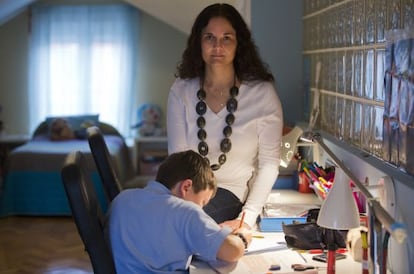Is homework a waste of time?
A Spanish mother has begun a petition against the limited benefits of after-school tasks

Every afternoon, when he gets home from school, Diego spends up to three hours doing homework. He often finishes his after-school studies just in time to eat something, shower, and go to bed. He has begun to show signs of stress. The 10-year-old’s sisters, Lara and Nadia, aged 12 and eight respectively, have much less homework, although they attend the same state school in Tres Cantos, a new town around 25 kilometers north of Madrid.
The boy’s teachers say he gets good grades, performs well in exams, and has above-average reading skills. But when his mother, Eva Bailén, talked to the school about the amount of homework he was being given, his teachers told her that he should be given 90 minutes to complete his tasks, “and if he doesn’t finish them, assume the consequences.”
I wasn’t against homework until I saw my child crying because he hasn’t been able to go out and play”
Eventually, she decided to start a petition on Change.org calling for standardization of homework within the Spanish education system. So far it has garnered 100,000 signatures. Bailén points out that at present, there are no state regulations on the amount of homework children can be given, and the matter is left up to teachers. “I am not against homework, and I think that children should do something, rather than just sitting around in the afternoons. That was until I saw my child crying because he hasn’t been able to go out and play,” she says.
Diego’s case highlights some of the problems with the Spanish education system: too much homework; lack of coordination between teachers; and repetitive, mechanical tasks that fail to take into account each child’s ability. This has led to tensions at home, because the family’s free time is conditioned by what teachers have decided. Some children no longer want to study or go to school, while others, who are from less privileged backgrounds and do not get the support of their parents, fall behind in their studies.
The risk of inequality
Some experts say there is a growing body of evidence to show that more homework time does not translate into better results. “Students who get support at home get better results, but not because they do more homework, but because they have a culturally enriching environment,” says educationalist Enric Roca.
A recent report by the OECD’s educational standards body, PISA, highlights this: “This is a call to governments and schools to focus on under-privileged children, who sometimes do not even have a place at home to do their homework,” says PISA analyst Daniel Salinas.
This is one of the arguments that the Spanish Confederation of Parents’ Associations (CEAPA) is using to call for a ban on homework being used to give end-of-year grades: “It creates tremendous inequalities, because children often cannot do their homework without help, and parent’s ability to do so depends on their own education, socio-economic level, schedule and their ability to explain concepts,” says CEAPA president Jesús Salido.
“A reasonable time limit has to be set,” says Luis Miguel Lázaro, professor of educational theory and history at the University of Valencia. He suggests a maximum of 40 minutes for junior high school students, and around an hour for high-school pupils. “But the key here is that teachers work together: you can’t have one teacher assigning a huge workload as though their subject was the only one that counted,” he says.
Homework is essential for a child to fully understand what he or she is being taught, says Luis Carbonel, the president of Concapa, which represents the parents of children attending Catholic Church-run schools. “They should be doing homework from the time they start school, but it needs to be proportionate to their age: a couple of hours a day in high school, but much less in junior high. One thing is to be told something, and another is to understand it by doing exercises and studying, or memorizing things at home,” he says.
Another reason why growing numbers of teachers, educationalists and parents are questioning the value of homework is that it appears to have no impact on Spain’s poor performance in PISA rankings. Finland, where schoolchildren spend the least time doing homework, far outperforms Spain.
Alfonso González, a biology teacher in Murcia and father of a high school student, recently sent a letter to his fellow teachers, which was later made public, saying that he had done much of his daughter’s homework for her: “She would do the first exercise, and I would make sure she understood what she had to do, and then I would do the other exercises. Thanks to this, my daughter has played the guitar, practiced canoeing, gone out to play with her friends, and been happy,” he say. “She is now getting excellent grades, and works on her own.”
González adds that he and his wife spent more time working with his daughter than most parents are able to. Recent surveys in the United States seem to support his approach, and show that there is no correlation between the amount of time elementary and junior high school students spend doing homework and their academic results.
Laura Bermúdez, a teaching tutor at a school in Murcia, says that only children who want to take work home do so, and that there are no differences in grades. That said, she believes that homework helps children develop the habit of studying.
The PISA report shows that a maximum of four hours a week is sufficient to improve students’ grades. “It makes no sense for children of elementary and junior high school age to be doing more homework than the OECD recommends for 15-year-olds,” says Eva Bailén.
“I don’t remember doing homework when I was small. I later learned that around that time, 1984, the education minister, José María Maravall, had banned elementary schools from issuing homework,” says Bailén. “If I didn’t do homework and got excellent grades, and went on to become a telecommunications engineer, what sense does it make to put my kids through the mill?” she asks.
“Homework is invading my right to a family life”

Overloading children with homework isn’t just of questionable educational value: growing numbers of parents say that it is damaging family life. Abel de Céspedes, a father of two children aged four and 10, appealed against his son’s failed grade for not doing his homework, arguing that: “Homework is invading my right to a family life, because they are extending the school day.”
The tax inspector, who is separated with joint custody, cut a deal with his eldest son’s school last year whereby the boy does as much homework as he can, voluntarily, and without it contributing to his grades.
“I’m not against homework,” he says, “but I want to be able to organize my home life. If my boy did all the homework he is given by his teachers, most of the three hours or so I have with my children after work would be spent on their homework.” But this year, the school changed its policy, and his son failed his Spanish language course, despite excellent exam results, because of the negative grades accumulated for not doing his homework. After he appealed to the local education board, the school backed down.
“I am fine with the school giving my kids homework, but it shouldn’t be obligatory. When they have exams, I make sure they study. But outside of school hours, I have a right to bring up my children as I see fit,” he says.
Tu suscripción se está usando en otro dispositivo
¿Quieres añadir otro usuario a tu suscripción?
Si continúas leyendo en este dispositivo, no se podrá leer en el otro.
FlechaTu suscripción se está usando en otro dispositivo y solo puedes acceder a EL PAÍS desde un dispositivo a la vez.
Si quieres compartir tu cuenta, cambia tu suscripción a la modalidad Premium, así podrás añadir otro usuario. Cada uno accederá con su propia cuenta de email, lo que os permitirá personalizar vuestra experiencia en EL PAÍS.
¿Tienes una suscripción de empresa? Accede aquí para contratar más cuentas.
En el caso de no saber quién está usando tu cuenta, te recomendamos cambiar tu contraseña aquí.
Si decides continuar compartiendo tu cuenta, este mensaje se mostrará en tu dispositivo y en el de la otra persona que está usando tu cuenta de forma indefinida, afectando a tu experiencia de lectura. Puedes consultar aquí los términos y condiciones de la suscripción digital.









































